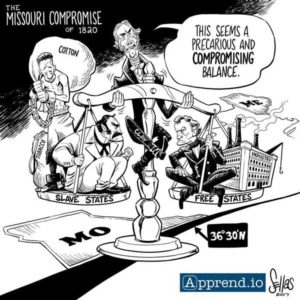Maine statehood and the consequences of compromise.
By Dr. Brian Purnell
Maine owes its statehood to slavery. Remember this when, in two years, we celebrate Maine’s two hundredth anniversary. In the midst of the platitudes and sales that will accompany the state’s bicentennial, remember the context that created Maine. Freedom for Mainers exacerbated slavery for black people, and strengthened slaveholders’ power.
 The Missouri Compromise enabled Maine to become a state. In 1818, Missouri applied to become a slave state. If Missouri permitted slavery, the South would control twelve states to North’s eleven and disrupt a tenuous balance of power.
The Missouri Compromise enabled Maine to become a state. In 1818, Missouri applied to become a slave state. If Missouri permitted slavery, the South would control twelve states to North’s eleven and disrupt a tenuous balance of power.
Slavery was only one difference between the regions. Northerners favored strong central government, cities, high tariffs, infrastructure, farming, manufacturing, and banking. Southerners desired weak central government (except when prosecuting fugitive slaves and securing land), low taxes, and profits from slavery funneled back into plantations. By the 1820s, the North’s economy no longer needed slave labor, although northern shipping, fishing, farming, and finance profited mightily from the South’s slave society. Few Northerners wanted to abolish slavery; most wanted slavery, and black people, to remain in the South.
Maine provided a solution for the dilemma Missouri caused. Congress declared in 1819 that Maine’s admission as a free state would be tied directly to Missouri’s entrance as a slave state. Congress should have called the compromise it passed in 1820 the Missouri-Maine Compromise. Without Maine, the balance between slave and non-slave states could not have been achieved. A rule also emerged for slavery’s future. For roughly thirty years, Missouri’s southern border marked the wall that separated slaveholding from non-slaveholding states. Maine’s independence strengthened slavery elsewhere.
As slaveholders’ power grew, so did an abolitionist movement. A party opposed to slavery’s spread arose in the North. The South, foreseeing slavery’s demise, attempted to dissolve the Union. Civil War ensued. Hundreds of thousands died. Much of the South smoldered in defeat. Slavery fell in blood and ash. Its death nearly cost the nation its life.
Mainers rightly celebrate their role in keeping the nation together, especially during the Civil War. Maine takes pride in that terrible event’s creation of what Abraham Lincoln called the nation’s “new birth of freedom.” Mainers fought and died to save the Union. After Gettysburg, Joshua Lawrence Chamberlain, the professor from Bowdoin College, emerged an unlikely war hero. Hannibal Hamlin, an anti-slavery Democrat from Maine, was Lincoln’s first Vice President. Harriet Beecher Stowe wrote the anti-slavery sensation Uncle Tom’s Cabin while living in Brunswick in 1852. Maine served as a terminus of the Underground Railroad, a series of safe houses that enabled untold numbers of black people to escape the United States and find freedom in Canada. In 2020, these important people and events of Maine’s history deserve honor and remembrance.
If not honor and pride, then honesty and integrity require that, alongside the expressions of jubilee, Mainers recognize how their independence came with a cost. After 1820, slavery spread. In the 1830s alone, 300,000 black men, women, and children were forced to move south, and between 1800 and 1860, more than one million black people, slave and free, were forced to move as the South’s demand for labor in cotton and sugar fields grew. This internal migration and domestic slave trade destroyed black families, inflating prices for black men in their prime working years and black women in their prime birthing years. The domestic slave market placed a premium on black women as breeders of slaves. The spread of slavery in the U.S. perpetuated rape and sexual violence, separated babies from parents, and promoted citizenship based on white racial purity.
These are not the topics a state usually includes when it recognizes its origins, but Maine is in a unique position to signal to the nation an important lesson: compromising on evil has incalculable costs.
Five of Maine’s seven Congressmen—Martin Kinsley, Joshua Cushman, Ezekiel Whitman, Enoch Lincoln, and James Parker—wanted to prohibit slavery’s spread into new territories. In 1820, they voted against the Missouri Compromise and against Maine’s independence. In their defense, they wrote that, if the North, and the nation, embarked upon this Compromise—and ignored what experiences proved, namely that southern slave holders were determined to dominate the nation through ironclad unity and perpetual pressure to demand more land, and more slaves—then these five Mainers declared Americans “shall deserve to be considered a besotted and stupid race, fit, only, to be led blindfold; and worthy, only, to be treated with sovereign contempt.” As we approach the bicentennial of Maine’s statehood, Mainers should celebrate the leaders who voted against Maine statehood, because they refused to support the spread of slavery.
Maine occupies a unique position in the nation’s history. It can name as heroes in a bicentennial celebration legislators who stood against its independence. They knew that freedom that promoted slavery was not freedom at all, and not worth the price. In commemorating them, we can build the courage to follow their lead on current issues of consequence. One hundred years from now, when a new generation of Mainers gathers to mark statehood, it will look back on 2020, the year we remembered those who stood against independence, and for freedom.
Dr. Brian Purnell is a professor of Africana Studies and U.S. history at Bowdoin College.





0 Comments